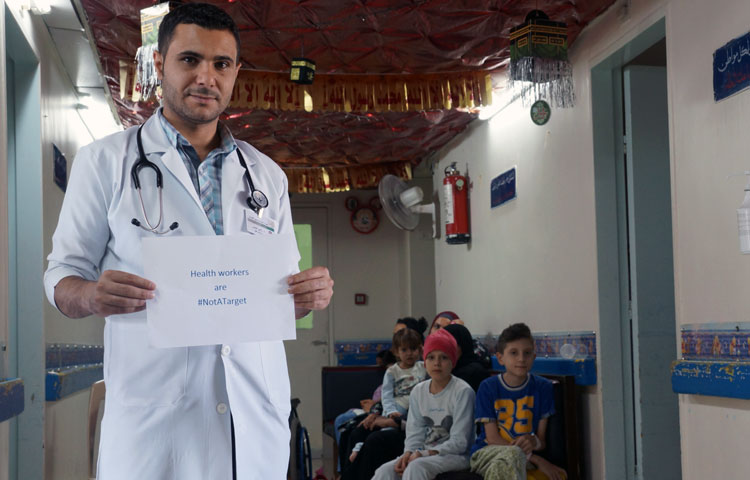Statement by Dr Ahmed Al-Mandhari. WHO Regional Director for the Eastern Mediterranean
19 August 2018, Cairo, Egypt - The Eastern Mediterranean Region is witnessing an unprecedented number, magnitude and severity of emergencies, culminating in a major humanitarian tragedy. More than 70 million people are in need of health aid, including 16 million people displaced within their countries, and 32 million people who are food insecure.
Behind the numbers are real people, each one caught up in the absurdity of war and facing daily hardships and challenges: the mother wondering where the next meal for her hungry children will come from; the cancer patient struggling to find a hospital that is equipped to provide treatment; the woman who has been abused and humiliated; the elderly man exposed to scorching heat with only a tent for shelter; the little boy caught in the cross-fire and now paralyzed for life.
A number of countries in our Region, including the Syrian Arab Republic and Yemen, have become the new face of humanitarian suffering. Besieged populations are cut off from aid and subjected to gross human rights violations. Millions of refugees and displaced people live in overcrowded camps and non-camp settings, exposed to often unsanitary living conditions. Long-forgotten diseases have re-emerged, and people are dying of diseases that could be easily and quickly treated under normal circumstances. Mass population movement has caused infectious diseases to cross borders to neighbouring countries, putting entire regions at risk.
The need to provide life-saving health aid, protect people from deadly diseases, and ensure that all people everywhere have access to health care has never been greater. And yet, the threats facing health workers operating in conflict settings in our Region are greater than ever. The Syrian Arab Republic remains the world’s most dangerous country for health workers. In Afghanistan, Gaza, Libya, Pakistan, Somalia, Sudan and Yemen, health workers are targeted and murdered.
This year alone, 423 incidents of attacks on health care occurred in countries and territories of the Eastern Mediterranean Region, in which 124 health workers and patients were killed. Beyond the senseless loss of life, these attacks have even greater consequences, depriving thousands of people of life-saving medical care at the time when they need it most, leading to even more unnecessary deaths, and eroding the trust of affected populations in health facilities as neutral spaces and safe havens for care.
People caught up in armed conflict lose their livelihoods, their homes, and almost everything they own. It is our collective responsibility to make sure that they do not lose one of their most basic rights: their right to health. Doctors, nurses, paramedics, vaccinators, pharmacists, midwives, community volunteers and other health workers who risk their lives every day must be protected. Even in times of crisis, no one should die because they lack access to health care, and no one should die as they try to provide it.
Today, on World Humanitarian Day, I reiterate WHO’s call for the protection of health workers and health facilities under International Humanitarian Law, for immediate and sustained access to all people-in-need of health aid, and for peaceful political solutions to conflicts in the Region that have taken their toll on millions of innocent civilians. The time has come for people to rebuild their lives and their communities, for collapsed health systems to be restored, and for countries to start the journey to reconstruction and recovery.
Related links

Health workers and patients in the Eastern Mediterranean Region are #NotATarget
Attacks on health care on the rise throughout Syria in first half of 2018, says WHO


